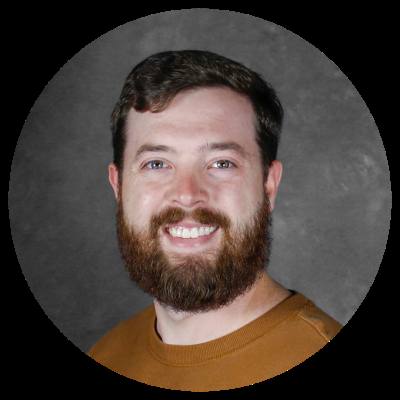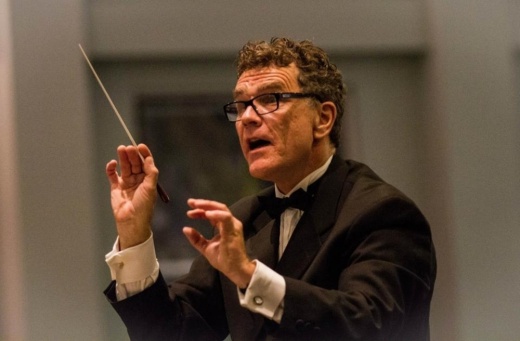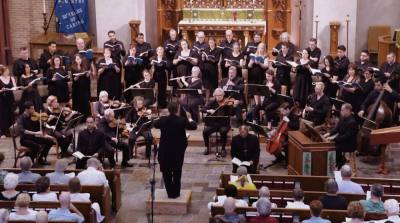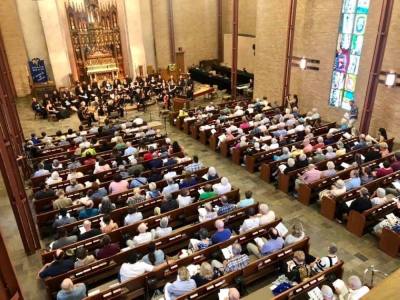This is the question Barry Williamson, founder and artistic director of the Texas Bach Festival, encounters frequently. His answer typically begins by explaining how the classical German composer of the Baroque period “set the table for 300-plus years of composers after him.”
Bach’s "The Well-Tempered Clavier" is the first composition to establish the major-minor tonal system that is used throughout the Western world, Williamson said.
“He’s the guy that made it all possible, so every musician and group [in] the Western Hemisphere owes their success, and ability to perform and sound beautiful to Johann Sebastian Bach,” Williamson said. “He directly influenced many composers through his compositional work as well.”
The Texas Bach Festival’s mission is to champion and advance the timeless music of Bach and the subsequent composers inspired by him. The nonprofit organization coordinates the only Bach festival in Central Texas, converging on the Georgetown and Austin area from late May through late June.
The organization brings together a host of professional string players, brass musicians, woodwind artists, pianists and singers to perform a collection of classical numbers from the past 300 years. Many come from other arts groups, such as the Austin Symphony Orchestra or Chorus Austin.
“Our players and singers are the best there are,” Williamson said. “We don’t have volunteer performers. These are established pros—area professionals that make their living [performing] concerts with many groups. So we get the best there is.”
TBF’s 2022 season included Italian tenor Angelo Ferrari, a critically acclaimed singer who has performed in different countries around world; Canadian violinist Patrice Calixte, an experienced orchestra musician and associate concertmaster of the Austin Symphony; and Stephen Girko, who served as principal clarinetist for the San Antonio Symphony and Dallas Symphony Orchestra before taking on the role in the Austin Symphony.
The nonprofit group is working on its 2023 lineup of concerts. Williamson plans to bring on Peter Bay, music director of the Austin Symphony, for a Michael Haydn "Requiem in C Minor" and Mozart "Requiem in D Minor" concert that Williamson and Bay developed.
“It’s a giant project to hire him to be a guest conductor, and the orchestra has to be a little larger than usual and the chorus a little larger than usual,” Williamson said.
To pay the performers, rent venues and host the festival, the organization relies on donations and grants. Williamson said the TBF welcomes everyone’s participation, from an audience, donor or volunteer standpoint.
“Every single dollar that they invest in us is not only tax deductible, but it goes toward making our mission statement come alive,” he said.
Meanwhile, the organization is planning a luxury trip to the capital cities of Budapest, Hungary; Bratislava, Slovakia; and Vienna, Austria, traveling to each via the Danube River. Travelers will attend live performances in historic venues, and be escorted and tutored by Williamson. TBF is led by a board of directors as well as an advisory board. The organization is also seeking additional qualified individuals who are passionate about the music of Bach to join its leadership team.
Bringing back Bach
The Texas Bach Festival celebrates Johann Sebastian Bach, one of history's most profound and influential composers.
The Texas Bach Festival celebrates Johann Sebastian Bach, one of history's most profound and influential composers.
- Bach was born March 31, 1685, in Eisenach, Germany.
- When he was 10 he was orphaned and went to live with his brother, Johann Christoph. His brother, the organist at St. Michael's Church, exposed him to the works of German, French and Italian composers.
- In 1717, Bach was jailed for a month after his resignation as court organist to Duke Wilhelm Ernst was denied.
- Bach had an optician named John Taylor perform eye surgery on him in 1749 in an effort to treat cataracts. Bach was left blind, and Taylor would later perform the same procedure on composer George Frideric Handel, who was also left blind.
- By the time Bach died in 1750, he composed 1,128 pieces of music. Another 23 works were lost or went unfinished.







